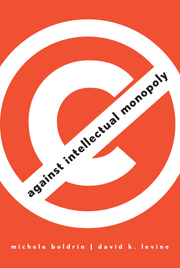Against Intellectual Monopoly
By Kristopher A. Nelson
in
March 2009
400 words / 2 min.
Tweet
Share
Against Intellectual Monopoly, a book by by Michele Boldrin and David K. Levine, two economists who have proposed abolishing copyrights and patents: It is common to argue that intellectual property in the form of copyright and patent is necessary for the innovation and creation of ideas and inventions such as machines, drugs, computer software, books, […]
Please note that this post is from 2009. Evaluate with care and in light of later events.
Against Intellectual Monopoly, a book by by Michele Boldrin and David K. Levine, two economists who have proposed abolishing copyrights and patents:
It is common to argue that intellectual property in the form of copyright and patent is necessary for the innovation and creation of ideas and inventions such as machines, drugs, computer software, books, music, literature and movies. In fact intellectual property is a government grant of a costly and dangerous private monopoly over ideas. We show through theory and example that intellectual monopoly is not necessary for innovation and as a practical matter is damaging to growth, prosperity and liberty.
This book seems to come at the issue from a libertarian perspective, which I sometimes have problems with (mostly due to a tendency of some libertarians to 1. act selfishly and without a consideration of other people and 2. want to de-regulate economic behavior while re-regulating social behavior, something that appears inherently contradictory).
Nonetheless, the idea of getting rid of IP (in its current form, anyway) is one worth exploring, at least as a kind of “what if?” experiment that can help us understand the pros and cons of various approaches to IP protection and its impact on economics, development, etc.
The authors contribute to a blog as well. A sample post from a different contributor:
There are some decent arguments out there that argue in favor of a state, welfare rights, war, democracy, drug laws, and so on. They are all flawed, since libertarianism is right, but there are coherent, honest arguments that we libertarians have to grapple with.
But it is striking that there are no decent arguments for IP–as Manuel Lora remarked to me, “You know, I haven’t seen a good pro IP article ever.” This is true.
As I mentioned earlier, this is an interesting perspective I hope to explore further, though not from a libertarian point of view.

![Reblog this post [with Zemanta]](http://img.zemanta.com/reblog_c.png?x-id=7a0b4f4a-967d-4ac3-bb99-bd35923e5422)